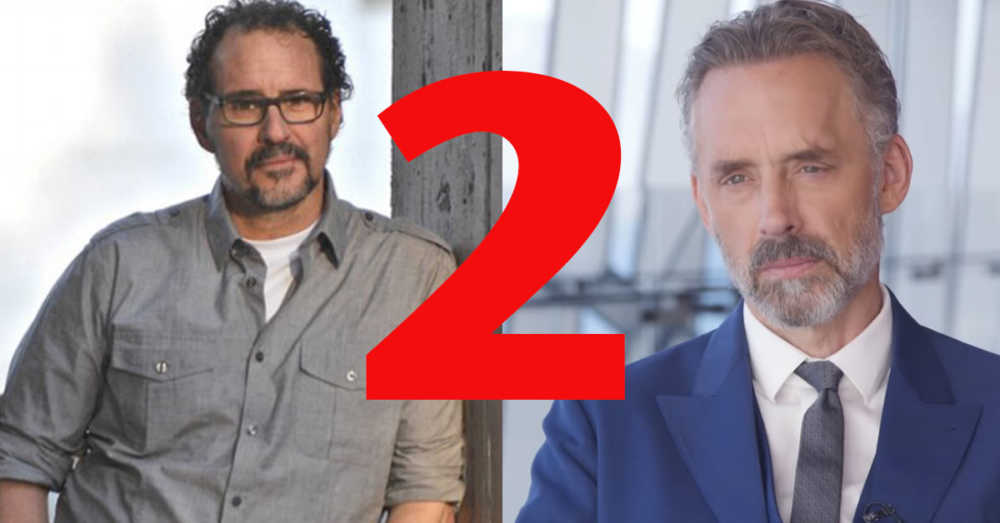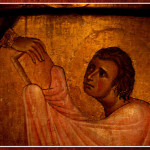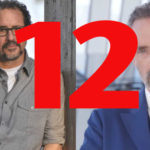We run our website the way we wished the whole internet worked: we provide high quality original content with no ads. We are funded solely by your direct support. Please consider supporting this project.

Part 2 (of 15): Can ‘Being’ Be Justified?
Assessing Jordan Peterson’s “12 Rules for Life”
by Greg Boyd
~“Pain and suffering define the world. Of that, there can be no doubt.” ~
Jordan Peterson
One of the things that makes Peterson’s approach to understanding life so intriguing and appealing to so many people is that it is remarkably multifaceted. 12 Rules of Life simply cannot be filed into any of the usual categories. Is it a work of psychology, philosophy, evolutionary biology, metaphysics, the history of religious ideas, social commentary, political theory, cultural history, the history of literature, practical wisdom, or even theology? The only answer that can be given is –“yes!”.
Yet, if I was forced to describe what Peterson is seeking to accomplish in 12 Rules of Life in a single phrase, I would say he is offering a sort of existential theodicy. Peterson is not concerned with the question of how we can affirm the goodness of God in light of the massive suffering and evil we experience in our world. As we’ll discuss later on in this series, Peterson is ambivalent, at best, about the goodness, or possibly even the ontological existence, of God—at least as God has traditionally been understood. Rather, Peterson’s driving concern is with the question: how can we experience meaning, value, and goodness in the face of the relentlessly painful, and apparently meaningless, reality we are part of? Or, as Peterson phrases it in various ways throughout his book: How can we give our life a “meaning” that “would justify [our] miserable existence?” (64-5).
The starting point of Peterson’s intellectual endeavor, and the single most dominant theme running throughout 12 Rules for Life, is that existence is inherently painful. To exist is to suffer. Here is a small sampling of representative quotes.
~ “LIFE IS SUFFERING. THAT’S CLEAR. There is no more basic, irrefutable truth” (161).
~ “Pain and suffering define the world. Of that, there can be no doubt” (172).
~ “Pain matters, more than matter matters. It is for this reason, I believe, that so many of the world’s traditions regard the suffering attendant upon existence as the irreducible truth of Being” (35).
~ “The idea that life is suffering is a tenet, in one form or another, of every major religious doctrine…Buddhists state it directly. Christians illustrate it with the cross” (338; cf. 227).
~ “Life is in truth very hard. Everyone is destined for pain and slated for destruction” (149).
Similar to what we find in ancient Neoplatonism (including Christian Neoplatonism, e.g. Gregory of Nyssa), Peterson goes so far as to virtually equate existence with the Christian concept of “the fall,” as when he refers to “the terrible sin of Being, which everything must bear gracefully, just so it can exist” (230). By referring to the “sin of Being,” or elsewhere to our “sinful nature” (63), “the tragedy of Being” (216) or “the criminal fact of your fractured and damaged Being” (200) — Peterson is surely speaking metaphorically, for while such language would seem imply that things should have gone differently, Peterson adamantly denies this.
The cause of suffering, according to Peterson, is not that humans sinned by rebelling against God, as the New Testament teaches and as the Christian tradition has always believed. Rather, “the tragedy of Being is the consequence of our limitations and the vulnerability defining human experience.” Suffering is “the price we pay for Being itself—since existence must be limited, to be at all” (216). To exist, therefore, is to be limited as a definite thing, over-and-against everything else. It is to be spatially and temporally surrounded, and threatened by non-being, and for sentient creatures like human beings, this finitude, with its ever-present threat of non-being, inevitably entails anxiety, vulnerability, and pain.
Peterson illustrates the point by quoting (as he frequently does) Lao-Tse in the Tao Te Ching:
Though thirty spokes may form the wheel,
it is the hole within the hub
which gives the wheel utility.
It is not the clay the potter throws,
which gives the pot its usefulness,
but the space within the shape,
from which the pot is made.
Without a door, the room cannot be entered,
and without its windows it is dark.
Such is the utility of non-existence.
Peterson makes the same point by describing human existence as a story. For any story to work, Peterson observes, the characters of that story must have limitations and vulnerabilities. Stories work, in other words, only because they make use of “the utility of non-existence.”
If you are already everything, everywhere, always, there is nowhere to go and nothing to be. Everything that could be already is, and everything that could happen already has. And it is for this reason, so the story goes, that God created man. No limitations, no story. No story, no being (343).
Peterson illustrates his point by observing what happened to Superman leading up to the 1980’s. From 1938 up through the 1960’s, DC Comics kept removing limitations and ascribing more and more superpowers to Superman. As a result, “Superman became invulnerable” (344), his aversion to kryptonite notwithstanding. But then, Peterson notes, “a strange thing happened. He got boring. The more amazing his abilities became, the harder it was to think up interesting things for him to do” (344), which is why the franchise nearly folded in the 1980s. It was only when Artist-writer John Byrne took over and deprived Superman of many of the powers he had acquired over the years that the character was salvaged. Superman had to be given “some reasonable limitations,” Peterson notes, for
…[a] superhero who can do anything turns out to be no hero at all. He’s nothing specific, so he’s nothing. He has nothing to strive against, so he can’t be admirable.
And then he concludes,
Being of any reasonable sort appears to require limitation. Perhaps this is because Being requires becoming, as well as mere static existence—and to become is to become something more, or at least something different. That is only possible for something limited (345).
So, according to Peterson, the near-demise of the nearly limitless Superman illustrates that limitations, vulnerability, suffering and becoming are intrinsic to Being. And this leads to the central question driving Peterson’s entire project. Given the inevitability of suffering, which often is truly nightmarish, how should we, and how can we, become? More specifically, can we proceed forward in a way that gives meaning to our “miserable existence?” (65). And to ask this question is to ask: “Can Being itself, with its malarial mosquitoes, child soldiers and degenerative neurological diseases, truly be justified?” (347).
So far as I can see, Peterson’s central goal is to help people live out a positive response to this question. For Peterson is convinced that Being can be “justified.” On the flip side, and just as importantly, Peterson wants to help people, and society as a whole, to avoid the terrible personal and social consequences that ensue when the question of the justification of Being is answered negatively. As we’ll explore in subsequent posts, Peterson is convinced that if we conclude that Being cannot be justified, then our personal lives, and society as a whole, begins to become undone. Without a meaning to justify our existence, “the centre cannot hold” (367), to quote Yeats’s famous poem, “The Second Coming.”
To put the matter more specifically, Peterson wants to help us avoid the terrible consequences that ensue when nihilism is embraced, consequences that characterized the unthinkable atrocities of the twentieth century, which Peterson believes were the direct result of western culture abandoning its Judeo-Christian value system and embracing nihilism. And as we shall see, Peterson draws on a wealth of knowledge from evolutionary biology, psychology, sociology, and religious, literary and cultural history to help us find a meaning sufficient to stave of nihilism and to “justify Being.”
Evaluation: I will close with four brief critical observations, raised from the perspective of the historic orthodox Christian faith that I affirm, and from which I will be critically evaluating Peterson’s work throughout this series.
First, if we accept Peterson’s view that existence necessarily entails limitations, suffering, and becoming, it would seem that we are going to have to abandon the traditional Christian conviction that God can exist, and has in fact existed prior to creation, without any limitations, suffering or becoming (at least in the sense of improving in any respect). On the metaphysical conditions that Peterson has stipulated, if God exists as more than an archetype – viz. ontologically – God would have to be inherently involved in, if not identified with, the limitations, suffering. and becoming that is intrinsic to all reality. The conception of God that best fits Peterson’s metaphysical scheme, so far as I can discern, is the God advocated by Process thought. But, as I’ve elsewhere argued, Process thought lies far outside the parameters of Christian orthodoxy, in large part because of the reasons just given.
Second, if we accept that suffering is inherent to Being, then we clearly must abandon the biblical and traditional Christian teaching that creation suffers because something has gone wrong. To be sure, we may still find profound truth in this teaching by considering it a myth, as we shall later see Peterson do effectively. But while some ancient and contemporary orthodox Christians have certainly been willing to grant that Genesis 3 is a mythic expression of the fall, hardly any major theology has denied that there was an actual fall in our primordial past. (The earlier mentioned Christian Neoplatonists being the only exception). In the orthodox Christian view, human history could have, and should have, unfolded differently. The “sin” and “tragedy of Being” that Peterson refers to is sinful and tragic precisely because it didn’t have to be this way. We will later see that the absence of any concept of a fall as an actual event in Peterson’s thought is among the most fundamental considerations that sets his over-all perspective in radical opposition to that of historic orthodox Christianity.
Third, if we accept that suffering is inherent in Being, then we clearly must abandon the biblical and traditional Christian teaching that God will in the future triumph over all evil and eliminate all suffering from creation. As with the fall, we could still find some truth in this teaching by considering it a myth. And we of course could continue to work to eliminate as much suffering as possible, which is precisely why Peterson wrote his book. But if Peterson is correct, suffering can never be fully eliminated from the world. There can be no final victory. While Christians have always been willing to grant that the biblical expressions of this future victory are expressed in mythic terms, both the Bible and the Christian tradition hold that there will be an actual, glorious, final victory, after which time God’s perfect love will permeate every square inch of the cosmos.
And forth, if we accept that suffering is intrinsic to Being, I believe we are going to have to radically rethink the traditional Christian convictions that God is perfectly good and all powerful and that he created a good world from nothing (ex nihilo). For if nothing has gone wrong, we must accept that either the Creator intentionally brought forth a creation that was “subject to futility” and “groaning in labor pains” (Rom 8:22-23), which arguably calls into question God’s perfect goodness, or this misery-filled creation is the best God could do, which arguably calls into question God’s omnipotence. And either way, we will need to rethink the biblical and traditional understanding that creation was originally “good.” Again, the only view of God that Peterson’s metaphysical tenets can accommodate is something approximating the God of Process Theology.
Personally speaking, I find my reasons for embracing the biblical and traditional Christian perspectives on these four matters to be more compelling than Peterson’s case that limitation and suffering are inherent in Being as such. I grant that all created being is limited and thus vulnerable to suffering. But I am not persuaded that created being inevitably entails suffering. And while I grant that God had to accept certain limitations as well as the possibility of suffering when God created the world, I am not at all persuaded that God must have limitations and experience suffering, let alone becoming (in the sense of improving).
However, as much as I disagree with Peterson’s implicitly unorthodox starting point, this does not mean I deny that he has some truly insightful things to teach us, both about the nature of reality and about how we can best live, given the nature of reality. As I will argue in subsequent posts, many of Peterson’s teachings are as helpful as others are controversial – and on occasion, I will argue, they are both.
Category: General
Tags: Book Reviews, Books, Jordan Peterson
Related Reading

Love Over Fear: The Dan White Jr Interview (podcast)
Our own Dan Kent interviews Dan White Jr about his new book: “Love over Fear: Facing Monsters, Befriending Enemies, and Healing Our Polarized World“ Episode 511 http://traffic.libsyn.com/askgregboyd/Episode_0511.mp3

Will There Be A Launch Event for Crucifixion of the Warrior God?
In this episode Greg gives an update on book release plans for “Crucifixion of the Warrior God.” http://traffic.libsyn.com/askgregboyd/Episode_0038.mp3

Part 3: Disarming Flood’s Inadequate Conception of Biblical Authority
Image by Ex-InTransit via Flickr In this third part of my review of Derek Flood’s Disarming Scripture I will offer a critique of his redefined conception of biblical inspiration and authority. I will begin by having us recall from Part I that Flood holds up “faithful questioning” over “unquestioning obedience” as the kind of faith that Jesus…

How NOT To Be Christ-Centered: A Review of God With Us – Part IV
In the first three parts of this review of Scott Oliphint’s God with Us we’ve outline his attempt to reframe all God’s accommodations in Scripture in light of the Chalecedonian Creed. He, in essence, uses the mysterious union of God and humanity in Christ to justify asserting that the immutable God can really become mutable…

The Cosmic Dance Project
The story behind The Cosmic Dance The idea for The Cosmic Dance arose out of Greg’s sharing his latest ideas with his small group (the three couples he and his wife Shelley share life with). Theological discussions are often a regular part of the conversation when they get together, and Greg, being the theologian in…

Part 12 (of 15): Egalitarianism and The Kingdom Community
Assessing Jordan Peterson’s 12 Rules for Life by Greg Boyd As we saw earlier in this series (see: post 7), Peterson argues that social hierarchies among humans are as natural as they are among lobsters and every other species of animal on the planet. Whenever there is anything worth doing, anything of value, some people…
